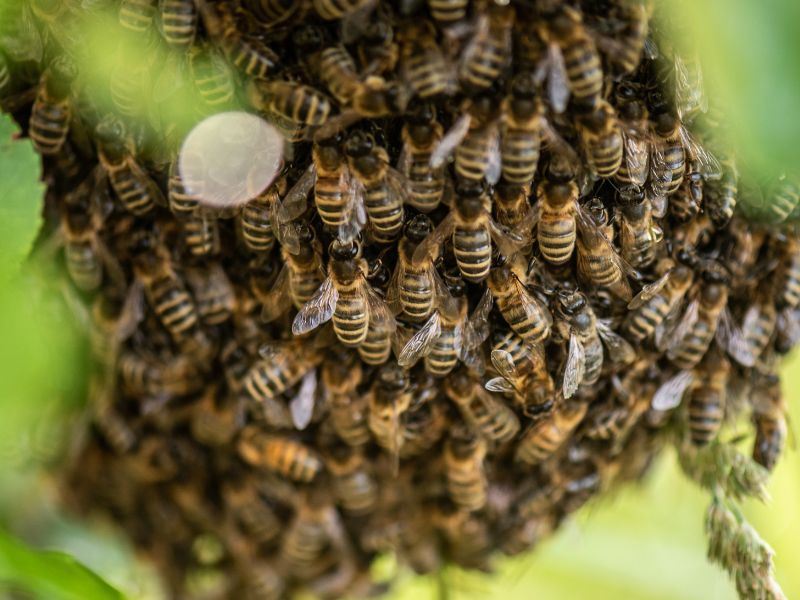Climate Solutions: How to Manage Bee Swarms in Your Compost Bin

What Should You Do First?
Many of us know that bees serve a vital role in the environment as pollinators, and that their populations have seen a concerning decline in recent years. However, it can still be alarming when a swarm of honeybees chooses to land around our home– including the inside of a compost bin! This happened recently in one of our backyard bins here at Solana Center, so we’d like to help you understand why swarming occurs, and what how to humanely deal with a swarm.
Why do bees swarm in the first place?
Honeybees are social insects that live in colonies of up to 60,000 individuals. However, each hive can only house so many bees, so when space gets tight enough the colony decides to split. Swarming is therefore a good thing: it means that the population is growing! The queen, who is the only egg-laying member of the colony, lays an egg for another queen. Once the new queen is ready to lay eggs herself, one of the queens heads off with about half of the colony to start up a new hive. This is what is referred to as “swarming”: a large group of bees with a queen, searching for a new home.
Are swarming bees aggressive?
As intimidating as a large cloud of energetic bees can be, please note that swarming bees are not aggressive. Bees’ instinct to sting comes from a desire to protect the hive from danger. However, when swarming, the bees have no hive to defend and will not sting.
What can I do about bee swarms in my compost pile or around my home?
Call a beekeeper or bee removal company, NOT an exterminator! Since bees are both vital and threatened, please do not call an exterminator, which will kill the bees. Choose a resource that offers humane relocation of bees so that the colony can find a safe new home. One option serving San Diego County is AA Beekeeper.
If you’re feeling brave, remove the lid of the compost bin at night. Especially if the colony has just moved into a bin and hasn’t settled in yet, exposing the colony may encourage them to seek out a safer home. You can do this at night when the bees are less active, then you can head inside to leave them to sort it out. However, note this may only be a temporary solution, as they could seek out an equally-incompatible location around your home.
Prevent bees from entering the bin. You can bee-proof your compost bin by covering any bee-sized or larger openings with mesh; just make sure you aren’t limiting airflow to the pile. Or, consider leaving the lid off the compost bin during spring and summer when swarming is most common. If you choose to do this, ensure you have a thick, moist topper covering the compost so it won’t dry out.
